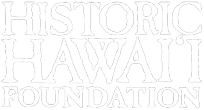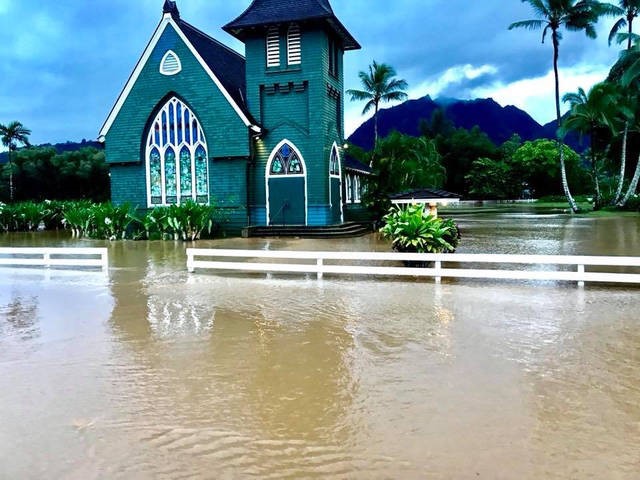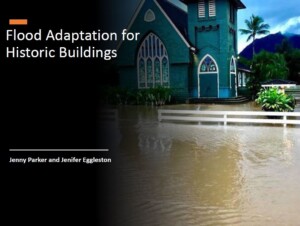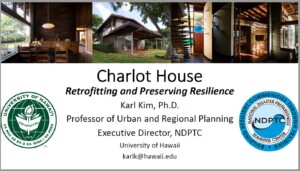Hawai‘i Preservation Webinar:
Flood Adaptation for Historic Buildings
Historic Hawai‘i Foundation, in partnership with the Department of the Interior’s National Park Service, will offer a free webinar on Guidelines for Flood Adaptation for Rehabilitating Historic Buildings.
Date: Wednesday, March 2, 2022
Time: 10:00 to 11:30 a.m.
Cost: Free
Virtual Webinar via ZOOM
VIEW THE VIDEO REPLAY OF THE MAIN PRESENTATION BELOW
Scroll down to view the replay and presenter slide decks.
Image at top: Wai‘oli Hui‘ia Church, Hanalei, Kaua‘i courtesy Susan Ferrell.
The historic Mission Hall at Wai‘oli Hui‘ia sustained substantial damage in the devastating flood of April 2018. The Church received a grant from the Freeman Foundation through Historic Hawai‘i Foundation for repairs to the hall’s wood floors, underlying support structure, and associated electrical, walls, trim and doors in the hall and attached kitchen.
Additional Resources
Click on the graphic at left to view the Flood Adaptation for Historic Buildings slide deck.
The Guidelines on Flood Adaptation for Rehabilitating Historic Buildings
Flooding risk has long been a major challenge for many historic properties. Changing weather patterns, stronger hurricanes and other extreme weather events, sea level rise, increased nuisance flooding, king tides, and continuing development in floodplains are some of the factors increasing the risk of flooding events, both in terms of their frequency and magnitude.
Some historic properties that have never flooded before may now be exposed to this risk, and those that flooded infrequently in the past may experience more instances of flooding or of water reaching higher levels than ever before. ~National Park Service
The seminar provides training to members of the public, private, nonprofit or government sectors who own, manage, steward or are interested in rehabilitating historic buildings.
Flood Adaptation for Historic Buildings
Date: Wednesday, March 2, 2022
Time: 10:00 – 11:30 a.m. HST
This seminar has been approved by the America Institute of Architects (AIA) for 1.5 AIA/CES (HSW) and by the American Planning Association (APA) for 1,5 certificate maintenance credits.
ABOUT THE COURSE
The Guidelines on Flood Adaptation for Rehabilitating Historic Buildings was produced in response to a request for technical preservation guidance specific to historic properties at risk of flooding. The goal of the Guidelines on Flood Adaptation is to provide information about how to adapt historic buildings to be more resilient to flooding risk in a manner that will preserve their historic character and that will meet The Secretary of the Interior’s Standards for Rehabilitation. The webinar will present an overview of the Guidelines and recommendations for implementation.
A case study will present a methodology and evaluation example for the Charlot House, a historic building in Kāhala, O‘ahu. The Community Design Center and the Department of Urban and Regional Planning at UH-Mānoa are applying the Guidelines to prepare a Disaster Preparation Plan for the property.
WHO SHOULD ATTEND?
• Public, private and nonprofit entities that own or manage historic properties in Hawai‘i
• Government agencies and funders who provide financial resources and information on climate resiliency and flood adaptation measures
• Community organizations or individuals with stewardship responsibilities for historic buildings
• Land use professionals, including attorneys, realtors and appraisers
• Land use and design professionals, including planners, architects, engineers, landscape architects, archaeologists, cultural resource managers, historians and architectural historians
• Community organizations or individuals with stewardship responsibilities for historic buildings
• Homeowners and other members of the public or organizations interested in flood adaptation measures for historic buildings
PRESENTERS

Jenifer Eggleston began her career with the National Park Service in in 2007 as the primary grants manager for the Hurricane Katrina and Rita Historic Preservation Recovery Grant program. After 7 years with the grant program Jenifer moved to the Office of the Associate Director for Cultural Resource, currently serving as the Chief of Staff. Additionally, she is one of the primary team members responsible for guidance and training regarding adapting historic buildings to the threat of flooding; co-authoring the recently released Guidelines on Flood Adaptation for Rehabilitation Historic Buildings. Before coming to the National Park Service Jenifer worked at an education nonprofit and the National Trust for Historic Preservation’s Community Revitalization Department. She holds a Bachelor of Arts in historic preservation from the University of Mary Washington and a Masters of Science in Urban and Regional Planning from the University of Memphis.

Jenny Parker is an architectural historian in the Technical Preservation Services office of the National Park Service where she produces guidance materials and presentations related to the Secretary of the Interior’s Standards for the Treatment of Historic Properties. Along with co-authors, she recently published Guidelines on Flood Adaptation for Rehabilitating Historic Buildings. Ms. Parker is also responsible for the review of Federal Historic Tax Credit projects in Alabama, Florida, and North Carolina. She holds a Master of Fine Arts in Historic Preservation from Savannah College of Art & Design and a Bachelor of Science in Building Science from Auburn University.

Karl Kim, PhD, is a Professor in the Urban and Regional Planning Department at the University of Hawai‘i at Mānoa. He received undergraduate education from Brown University and Ph.D. in Urban Studies and Planning from the Massachusetts Institute of Technology. Dr. Kim is Editor-in-chief of Transportation Research: Interdisciplinary Perspectives; Associate Editor of Transportation Research, Part D, Transport and Environment; and formerly Editor-in-chief of Accident Analysis and Prevention and formerly Editor of Korean Studies. He served as Chairman, National Domestic Preparedness Consortium (ndpc.us) and Vice Chancellor for Academic Affairs (Chief Academic Officer) of the University of Hawaii at Mānoa, overseeing strategic planning, accreditation, tenure and promotion, and international programs. Dr. Kim holds faculty appointments in the Center for Korean Studies, and the School of Architecture and serves on several committee of the Transportation Research Board. He served as Chair of the Pacific Risk Management Ohana and was elected to the Board of North American Alliance of Hazards and Disaster Research Institutes (NAAHDRI).

Dr. Elaine Jackson-Retondo, Region Preservation Partnerships and History Programs Manager, Interior Regions 8, 9, 10 and 12 in the National Park Service Pacific West Regional Office, earned her Doctorate in Architectural History and Masters of Architecture from the University of California, Berkeley and her Bachelor of Architecture from the University of Notre Dame in South Bend, Indiana. She has worked in the National Park Service since 2002.
Jackson-Retondo’s current and past work has included the National Park Service’s American Latino Heritage Initiative, Asian American Pacific Islander Initiative, Japanese American confinement during World War II, Cesar Chavez and the Farm-worker Movement, the National Park Service’s Mission 66 Program, and 19th century carceral institutional landscapes.

Kiersten Faulkner is the chief executive of Historic Hawai‘i Foundation and oversees all aspects of its preservation programs, strategic planning, business lines and operational matters. She holds a Master of Arts in Urban and Environmental Policy from Tufts University and is a member of the American Institute of Certified Planners (AICP).




